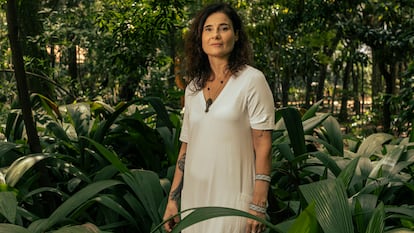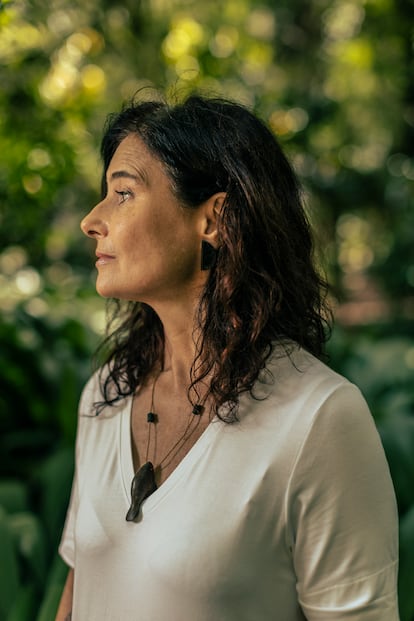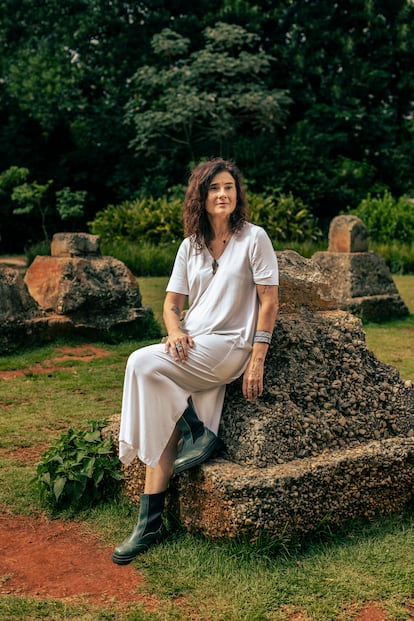Eliane Brum, journalist and climate activist: ‘Capitalism has destroyed our survival instinct’
She decided to fight on behalf of the Amazon on the frontlines of its destruction, moving from São Paulo to Altamira. In her writing, she warns that putting the world’s largest tropical rainforest at risk could mean a holocaust for many species, including our own


She writes about the present to give her reader a glimpse of a future that is just around the corner. The columns of Eliane Brum (Ijuí, Rio Grande do Sul, Brazil, 57 years old) are like punches to gut, screams issued at the top of her lungs that warn of the climate emergency, or her analysis of her country Brazil’s gravest problems. It’s clear that she writes from the heart. But in person, she speaks softly, sweetly, as if wanting to make sure that her interlocuters pay the appropriate amount of attention to every word, which she chooses with care. Perhaps she learned this from her parents, both of them educators.
Brum grew up in the whitest part of Brazil, along the border with Argentina. If you were to grab a map, you’d see that Ijuí is at one end of the country; at the other, lies the Amazon, the world’s largest tropical rainforest. This jungle is, after surviving volcanos, glaciers, meteors, and continental shifts over the course of 50 million years, gravely threatened by the havoc we humans have wreaked in the last 50 years. And without the Amazon, the planet would be hellish.
Brum, an EL PAÍS columnist, wrote the book Banzeiro Òkòtó: The Amazon as the Center of the World, published by Graywolf Press (2021). It’s a combination of journalistic reporting and a plea from the heart of the climate emergency. It is also a personal chronicle of the profound transformation she experienced when she left São Paulo to live in the heart of the Amazon, in Altamira, which is located on the banks of the Xingu River. An epicenter of deforestation, it is a violent city. There, speaking out on ecology is as dangerous and politically toxic as it is difficult to find a house with a garden patio. They prefer them to be made of cement.
Steeped in three decades’ worth of journalism, Brum has published essays and novels, directed documentaries and in 2022, gave birth to a Spanish language journalism platform created in the Amazon called Sumaúma, a word that means ceiba in Portuguese. She wears the majestic tree in a tattoo on her forearm. Her interview with EL PAÍS takes place in a coffee shop during Brum’s brief stopover in São Paulo. Although Altamira has an airport, traversing the more than 1,860 miles between the two cities requires three flights.
When you’re in the jungle, do you read in the hammock before you go to sleep? What is that moment like?
I always read before I go to sleep. It’s very important to me. I lie down early in the hammock. A tailor in Altamira invented a marvelous technology, the apartment mosquito net, similar to a canopy. Now it’s much easier because I have a Kindle with a light, before I used a little light on my head. I read a lot of novels, I like to escape, because the rainforest demands one’s total presence, and from the hammock, I travel to other worlds and back. On the last trip, in November, I read The Navel of the World by Fran Baniwa, in which she answers to how whites have constructed the anthropology of her people.
“Since I was a young, I have been writing so that I do not die and do not kill.” An impressive statement. What was it like growing up in a small town in southern Brazil, at the extreme opposite of the Amazon?
That phrase comes from an event that happened when I was five or six years old, before I learned to read. I grew up in the dictatorship, at home they spoke about forbidden books. I wanted to resist, to be a guerrilla fighter. My father, the son of illiterate parents, was the first person in the family to learn to read. He founded a university that was considered subversive; and I was the daughter of that communist. He created a school in a rural area that ascribed to the Paulo Freire method, with a calendar that respected harvest times, a curriculum created in collaboration with small farmers… And the mayor, who was of the same political party as the dictatorship, closed the school. And, for the first time, I saw my father, my hero, be humiliated. The mayor told him: “Mr. Argemiro, don’t be sad.” I never forgot that condescending phrase. I saw my father destroyed. We went home in our Volkswagen Beetle, silent, with no one having done a thing. I thought, “I have to do something. I’m going to burn down City Hall.” I knew it was wrong, that such an act could have consequences, but I grew up in a world of idealism and struggle. I stole a box of matches and, before the rest of home woke up, I went to City Hall, lit a match, another match… Nothing happened. My first political act was a failure.
Then you learned to write.
For me, writing is just that, a way of starting a fire without committing a crime. When I was nine years old, I wrote my first poem so as not to die. Writing is so visceral, it gives me structure. It’s been a while since I’ve written strict reporting, only editorials, columns. A funny thing happened. I stopped crying.
And in your eyes, is that a good or bad thing?
When I don’t write, unsaid things churn inside me. It makes me feel terrible. As soon as I started writing, I began to cry again.

You say that the Amazon traps you like an anaconda. How did that happen?
Slowly, over the course of many years. It began in two ways. First, with the dictatorship’s propaganda, which gave birth to that enduring phrase: “The Amazon, a land without men for men without land.” Which is to say that, for them, the people of the rainforest were not people. The rich people from my town bought land there when I was young and openly talked about displacing Indigenous people. The second way was an Indigenous person named Xingu, who Funai (the National Foundation of Indigenous Peoples) brought to the town to give speeches. He must have been around 60 years old. He was placed in such pitiful accommodations that we invited him over and he stayed at our house for a while. Since my parents worked late, he took care of me. He taught me to sing in his language, he told me stories, we walked hand in hand. That marked me. He wrote very beautiful lyrics, like the Hail Mary in Tikuna, from a text that I had previously intuited as violent. The Amazon came to me through those experiences. I traveled there for the first time in 1997 and, as [Carlos] Drummond de Andrade’s poetry says, “the machine of the world has opened.”
Two decades later, in 2017, you came back to stay. You moved to Altamira, which you call “the frontline of the most important battle of our times.” What was your motivation?
For a decade, I had closely followed families who had been expelled from the rainforest by [the construction of the hyrdroelectric dam] Belo Monte. That gave me another perspective on the climate crisis. I understood that we were in a moment that required creating things that did not exist, making radical decisions.
For example?
During a trip in 2014, I met a person who lived next to the river named Raimunda Silva. We traveled together in a paddle canoe. That’s the best way: it’s slow and you don’t make any noise. Actually, while others paddled, she told me stories. The week before, she had seen the island where she lived with her husband, João, burn down. Norte Energía, the culprit, had set fire to the house with all their belongings inside. Everything was reduced to ashes. Raimunda sang to the plants, asking forgiveness for not having been able to save them. She also told me that her husband had been to the Norte Energía office to negotiate, but what are you going to negotiate when you have no choice? João, who was over 60 years old, understood that from then on, he would go hungry. And he had a stroke, and tried to convince his family that he wanted to immolate himself on the island to draw the world’s attention. I told his story in EL PAÍS, it made a big impact. We put together a team of psychoanalysts to listen to the suffering of the displaced, but I thought: “I defend the notion that the Amazon, nature, the site of life — not the market — are the center of the world. Either we make a radical shift when it comes to what the center and periphery are, or we have no options when it comes to facing the climate crisis.”
You like to define yourself as a listener first. What do you learn from the rainforest communities?
That nature, life, revolves around relationships, not individuals or groups. When I looked at the rainforest from here [São Paulo], no matter how much I read, I understood it as vegetation, dense, exuberant, deforested. I remember the first fire I lived through there, when I had become someone else. That’s when I understood that I was seeing holocausts. Because each tree is a planet connected to another planet, each one with millions of living beings. And when you see the rainforest burn, you have sloths dying, jaguars dying, macaws, monkeys, frogs, insects dying… Some with intolerable suffering. You watch holocausts helplessly. And, the next day, there is only silence. The rainforest is very noisy, it only falls into silence when it has died.
And it shows the extent to which absolutely everything is connected.
Understanding interdependence is quite transformational. I don’t see my house as my home. I learned this in the Amazon. I share my house with many other beings that live with me, spiders, toads… There is a type of ant that comes by once or twice a year; one day you wake up and there they are, crossing the house in a single file. Every season, a different neighborhood. We don’t kill snakes, we try to drive them out if they are poisonous. I also learned that one of the principal tools of struggle, of resistance, is happiness. We cry for the dead, but we also dance. The body is not denied, nor love, sex, the pleasure of being a body. People laugh, no matter how brutal the situation. I always covered human rights, but then I went back to my safe apartment. In the Amazon, there are weeks that almost every day something very brutal happens that affects people I know. It is impossible to deny that we live in a war.
Without anywhere to shut the door and hide.
No, I am in the banziero (an Amazonian term for the point at which the river turns into a vortez), in the middle of the whirlpool. There, you understand that time is circular, not linear. [Anthropologist] Eduardo Viveiros de Castro says that the Indigenous people in Brazil lived through the end of the world in 1500, and that perhaps they can teach us how to live after the end of the world.
Don’t you sometimes drown in the magnitude of the challenge?
I don’t miss any opportunity to laugh, you always have to be looking for life. Even though the Amazon is in the middle of the storm, I feel much lighter.
A recent apocalyptic headline: “2023 is the hottest year in millennia.” And yet, as we are talking, the people around us are drinking coffee, others are exercising in the park, others are driving. You argue that the solution for the planet is for us to Amazon ourselves, as you have done. Tell us more.
When I go to São Paulo or London, and I see people living as if there was no tomorrow [she laughs], I feel anxious, as if I were in an architectural model or a resort. I like [the philosopher] Bruno Latour’s saying: “Denialism is the tool elites have found to make the poor pay the climate bill.” Trump and Bolsonaro, the executives of big business, are that kind of calculating denialist. But most of us live another denialism. Capitalism has destroyed our survival instinct. Any being, no matter how primal, has it. No matter how much information people have, no matter much they shout, no matter how much the house is falling down on us, even if there is no need for scientific reports, it is enough to look out the window. People continue living as if this were a phase that will pass.
You chose Altamira because you are convinced that there, one can catch a glimpse of what our future will look like in years, decades or centuries.
Belo Monte caused a kind of localized climate crisis that in 10 years will radically change the landscape. People were torn from their territory, which was flooded, and they were flung to the cities’ peripheries. They lost ties. They died. Altamira became the most violent city in Brazil. There was a wave of suicides of children who had become teenagers in that disturbed territory.

Do you miss hearing Greta Thunberg’s voice as loudly?
The movement that Greta inspired is fundamental. I imagine myself in the place of her generation, it must feel so desperate to see your life in the hands of adult naysayers. I keep company with the young people of the rainforest. In 2019, Bolsonaro’s first year in office, we celebrated the fact that the Amazon is the center of the world. We invited the activists of Fridays for Future, Extinction Rebellion, Pussy Riot… to come from Europe to the heart of the rainforest. It was a very powerful encounter with the leaders of the rainforest. It materialized the displacement of that which is the center and the periphery. We are not going to get out of this abyss with the same Eurocentric, Western, white, binary, patriarchal language the dragged us here. We need to place the values of the peoples of the rainforest at the center. Thanks to them, nature survives.
Is that why you hold that the fight for the rainforest encompasses battles against patriarchy, feminicide, racism and the gender binary?
One cannot understand the climate crisis without understanding that it is intersected by issues of race, species, class and gender. Women are leading the struggle in the Amazon because some of the men have been corrupted.
How did your experiment of using gender neutral language in this book go?
At the beginning, it was quite difficult. It caused discussion. Now, what causes discussion is not using it. We need to find a language in which we all fit. In the jungle we are all human, free of hierarchy.
Human beings are conceited and arrogant.
And ridiculous! Our time on this planet is miniscule. I understood how ridiculous we were the first time I saw bioluminescent fungi. Fungi has been making sophisticated connections for billions of years.
Under Bolsonaro, Brazil was seen as a planetary environmental villain. How do you judge President Lula, in his past and current administrations?
Any answer must start with the fact that Bolsonaro committed genocide. Defeating a person who commits genocide in the election was the most important thing. Lula gives mixed messages. Brazil has everything it needs to be an ecological power, but he wants it to be that while continuing to produce more oil. These are irreconcilable factors. The introduction to millions of Brazilians to a new middle class came at the expense of nature, of the export of raw materials, without structural changes made to the distribution of income. Lula is a man who was forged in the mindset that oil is the country’s salvation, wealth. Most of the left in Latin America, perhaps across the world, is still living in the 20th century and has not yet come to understand what the climate crisis means. The right wing is not even talking about it. Brazil is an example. For the dictatorship and all subsequent governments, the forest is a body to be violated, to be exploited. The drama that we are living the worst emergency of our era on this home-planet with an extremely predatory ultraright and a left that does not understand the 21st century. And we’ve run out of time.
Sign up for our weekly newsletter to get more English-language news coverage from EL PAÍS USA Edition
Tu suscripción se está usando en otro dispositivo
¿Quieres añadir otro usuario a tu suscripción?
Si continúas leyendo en este dispositivo, no se podrá leer en el otro.
FlechaTu suscripción se está usando en otro dispositivo y solo puedes acceder a EL PAÍS desde un dispositivo a la vez.
Si quieres compartir tu cuenta, cambia tu suscripción a la modalidad Premium, así podrás añadir otro usuario. Cada uno accederá con su propia cuenta de email, lo que os permitirá personalizar vuestra experiencia en EL PAÍS.
¿Tienes una suscripción de empresa? Accede aquí para contratar más cuentas.
En el caso de no saber quién está usando tu cuenta, te recomendamos cambiar tu contraseña aquí.
Si decides continuar compartiendo tu cuenta, este mensaje se mostrará en tu dispositivo y en el de la otra persona que está usando tu cuenta de forma indefinida, afectando a tu experiencia de lectura. Puedes consultar aquí los términos y condiciones de la suscripción digital.








































